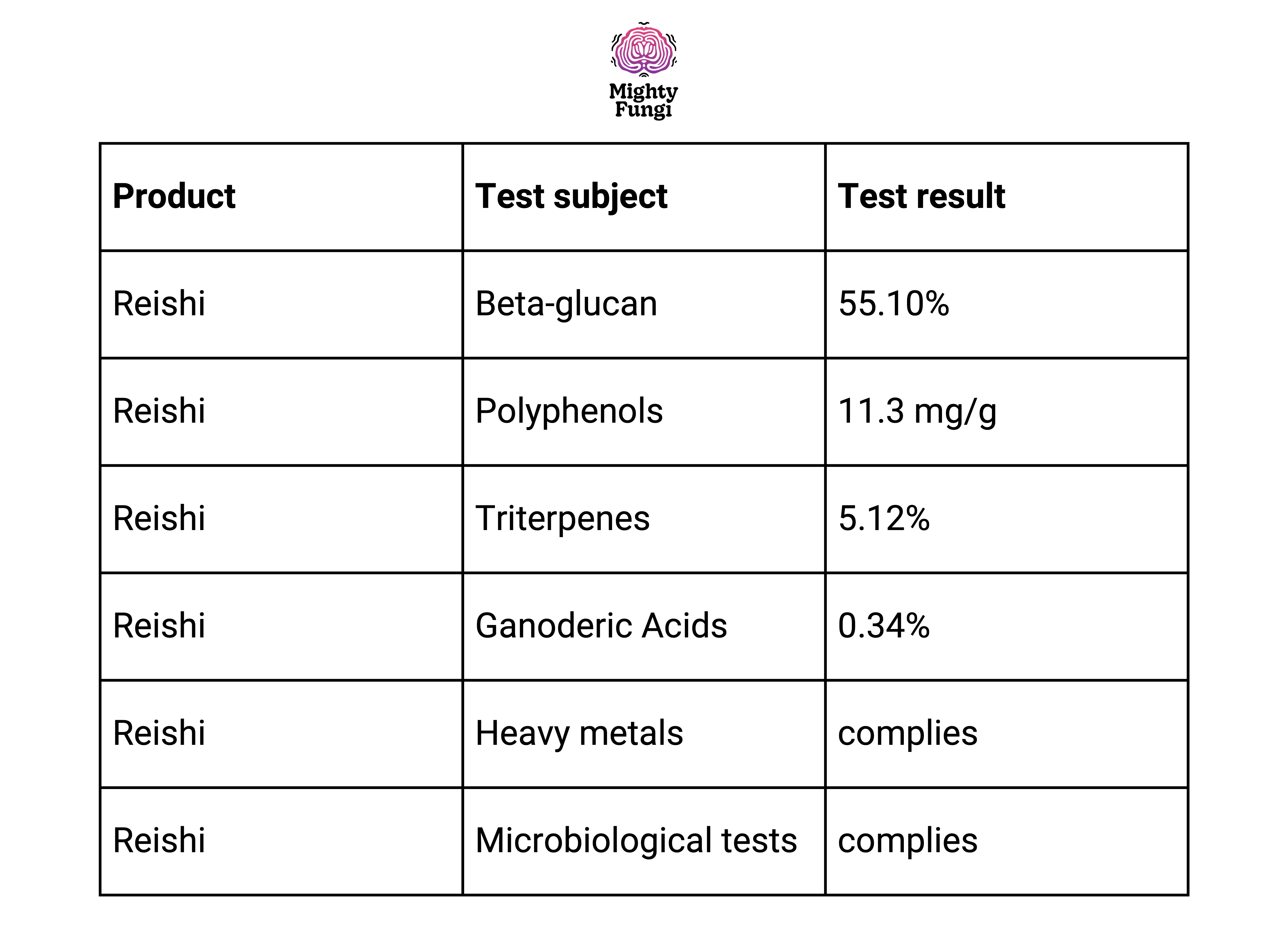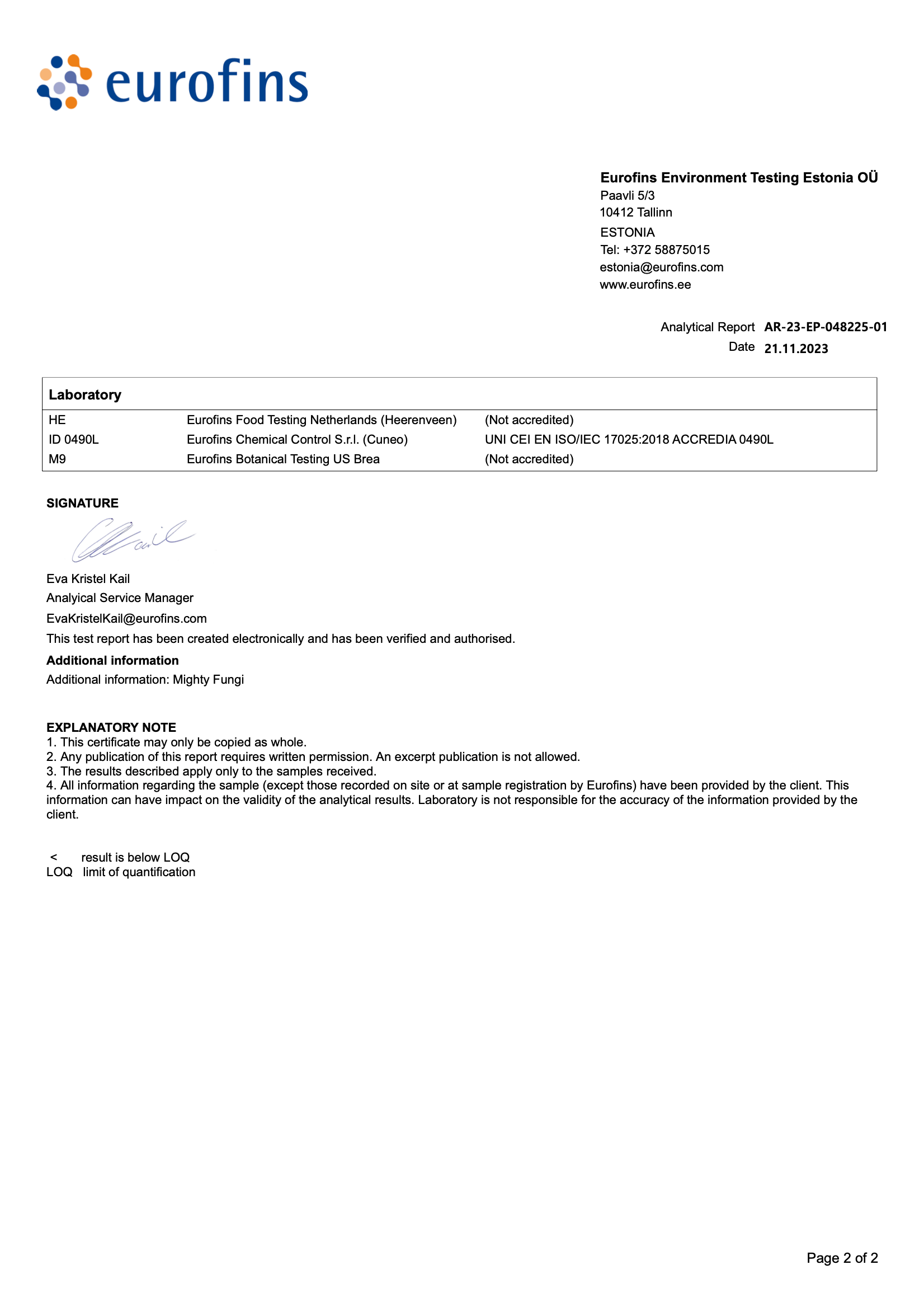Reishi - Test results!
WHY IS IT IMPORTANT TO TEST MUSHROOM EXTRACTS?
When consuming Reishi extract, make sure that you are familiar with the quality of the provider. Dietary supplement brands often only chase profits and do not control the quality of their products. Mushroom fruiting bodies are often powdered together with mycelium and mushroom feed. In most cases, it is not even known what the raw material grows on. The result is mushroom powder with unknown additives.
The market is full of various elixirs, powders, syrups and capsules. We cannot say which of the aforementioned is the best, but when consuming mushrooms on a daily basis, we definitely recommend being aware of the quality of the mushroom extract provider. Ask yourself if the product provider has listed:
Our Mighty Fungi’s Reishi extract comes from the Changbai Mountains in China, with a 20:1 concentration, and it is completely authentic Reishi extract.
World-class quality - our Reishi extract contains an unmatched amount of active ingredients that support your brain function, immune system and digestion.
Mighty Fungi’s selection includes the world's most comprehensively tested and controlled extracts. It is our personal mission to know we are offering you the best quality.
We test for all active ingredients with independent labs - Eurofins in Europe and RINP in the US.
Our supplier sends us certificates of analysis for each batch and we also double check our extracts do not contain any heavy metals, pollution or contamination with our local government facilities.
You can see all the results combined right here in the table below. This is a simplified summary. All the actual tests from the labs are also available below.
* The contents of active substances may vary slightly in different batches.

Great, but what does it all mean?
Now let's explain a little what all those numbers, complicated names and percentages mean.
ACTIVE INGREDIENTS
1. What are Triterpenes?
In short: They accelerate tissue healing, help fight diseases, viruses, microbes, cancer and fungal infections.
Triterpenes are known as the mechanisms of action of many medicinal plants. [1] Triterpenoids are bioactive substances in plants that help the plant fight disease, microbes, and herbivores. Triterpenes are beneficial to humans, and that is why they are used in many medicines. [2] Various studies have also found that triterpenes are good helpers for wound healing. In surgical wounds and other skin injuries, triterpenes significantly reduced recovery time. Namely, triterpenes modulate the production of ROS (reactive oxygen species), or oxygen, in the microenvironment of the wound and accelerate the tissue healing process. They have been described as anti-inflammatory, anti-diabetic, anti-tumor and anti-fungal agents, which are excellent immune system boosters thanks to their antimicrobial properties! [3]
2. What are Ganoderic Acids?
In short: Ganoderic acid is an anti-inflammatory and anti-viral, body-cleansing bioactive substance.
Ganoderic acid is the lowest bioactive substance in any mushroom. It is closely related to the aforementioned triterpenes, being one specific triterpenoid in Reishi. It is anti-cancer, anti-malarial, anti-inflammatory, anti-microbial and anti-viral. Among them, it has been found that, as a strong immune system booster, Ganoderic acid is hostile to herpes and HIV and repels them. [4] Ganoderic acid protects the liver. That is why Reishi is considered an excellent body cleanser of various poisons. [5]
3. What is Beta-Glucan?
In short: Beta-Glucan reduces the risk of cardiovascular diseases and cholesterol. Supports digestion and the immune system.
Beta-glucan has a positive effect on human health. Beta-glucan is a healthy fiber. For example, soluble fiber increases the time that food passes through the intestine, slows down the emptying of the stomach and the absorption of glucose into the blood. This means that your stomach will not be empty so quickly and the body can release energy stably. Beta-glucan consumption is associated with a reduction in blood insulin and cholesterol levels, high blood pressure and obesity. Beta-glucan is also an important antitumor agent. It is a recognized and important functional food ingredient.[5] This makes mushrooms excellent prebiotics (food for gut bacteria) that stimulate the gut and support the host to fight inflammation and disease.[6]
4. What are polyphenols?
In short: Supports the immune system, anti-cancer, balancing the nervous system
Polyphenols are naturally occurring plant compounds found in fruits and vegetables. Plants produce them as a defense against pathogens. They act as antioxidants in the body and reduce the damaging effects of free radicals in the body. Polyphenols have a healing effect on diseases of the heart and blood vessels, as well as a positive effect on disease prevention. These compounds prolong life and help fight cancer cells.[2] They also help to prevent neurodegenerative diseases such as Alzheimer's disease and Parkinson's disease. Currently anxiety disorders are also considered a neurodegenerative epidemic.[3]
Read more about Reishi HERE…
5. Heavy metals and contamination
When it comes to mushroom extracts, their therapeutic potency and product purity from contaminants and heavy metals are crucial. Both criteria can be validated in an impartial and reliably conducted laboratory. Testing for heavy metals and contaminants is an undeniably important aspect of mushroom extracts, as mushrooms have a tendency to store such compounds. Prolonged consumption of heavy metals can accumulate in the human body and lead to serious health issues (such as nervous system damage, cancer, birth defects, etc.).
COMPARISON WITH OTHER LEADING BRANDS
With most brands, there are no public results at all. Therefore, it can be assumed that the product has not been tested or the useful indicators of the mushroom extract are so low that the manufacturer has decided not to publish them.
What we can say is - no other brand is doing such extensive quality control for all active ingredients and any potential pollution and / or contamination.
We highly encourage you to ask for these tests whichever mushroom products you decide to use and make sure they come from reliable, third party labs.
ABOUT THE LABORATORY

INTERNATIONAL RINP Inc.
Our Reishi product has been tested in California, USA, in an impartial laboratory called International Rinp (International Research Institute of Natural Products). Rinp's team of researchers has top-level experience in research. For example, their works have been published in scientific journals such as Planta Medica, J. Chromatography B, Nutrition Cancer, Biochemical Pharmacology. The founder of the laboratory is the well-known chemistry professor Dr. Hongyang Wang. He and his team have years of experience testing various natural products, nutritional supplements, food, cosmetics and medicines. The laboratory has the skills to perform quality control on the products sent to them, to find out the chemical structure of the product, to perform complex identification and analysis of the products.
EUROFINS SCIENTIFIC
Eurofins Scientific through its subsidiaries is a world leader in food, environment, pharmaceutical and cosmetic product testing, discovery pharmacology, forensics, advanced material sciences, and in agroscience Contract Research services. With over 61,000 staff across a network of independent companies in 61 countries and operating ca. 900 laboratories, Eurofins offers a portfolio of over 200,000 analytical methods for evaluating the safety, identity, composition, authenticity, origin and purity of biological substances and products.
National Centre for Laboratory Research and Risk Assessment
LABRIS, The National Centre for Laboratory Research and Risk Assessment, is an Estonian national reference laboratory. LABRIS offers services in the areas of food, feed safety and animal health and provides risk assessments throughout of the food chain.
If you've read this far, you should be convinced that Mighty Fungi’s Reishi is one of the best extracts on the market!
Take the opportunity and try it NOW!

SEE ALSO: Lion's Mane, Chaga, Cordyceps





USED LITERATURE




